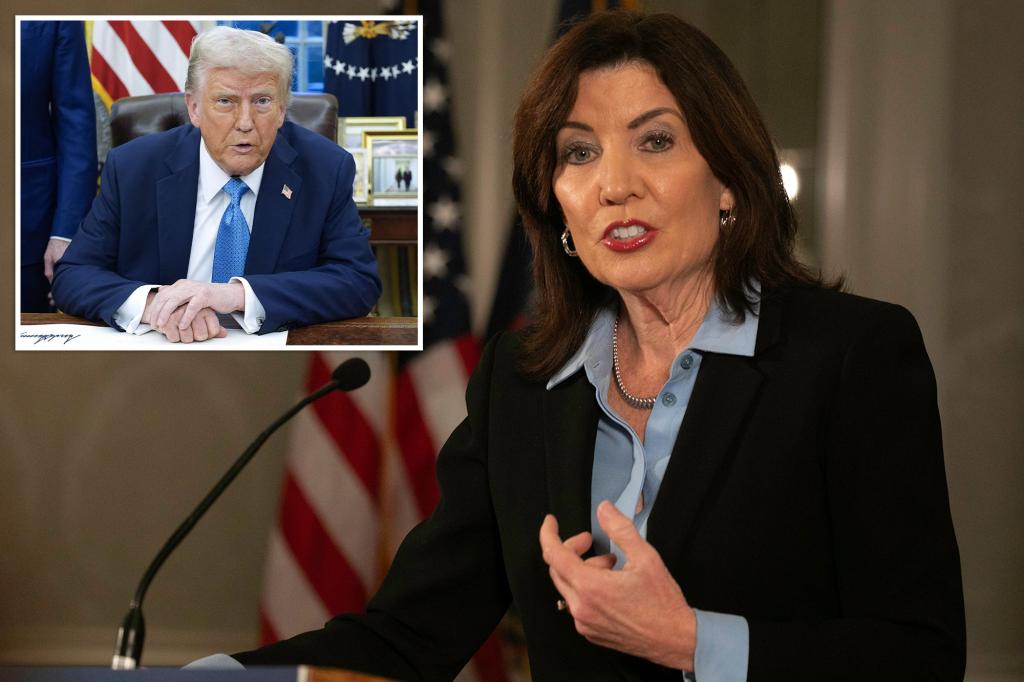The imposition of tariffs on Canadian imports by the Trump administration sparked immediate concern from New York Governor Kathy Hochul, who warned of significant negative consequences for businesses and consumers in her state and across the United States. Hochul emphasized the deeply integrated economic relationship between New York and Canada, highlighting the shared regional dynamics and the interconnectedness of businesses operating on both sides of the border. The close proximity of major Canadian cities like Montreal and Toronto to New York, facilitated by infrastructure such as the Peace Bridge, underscores the interwoven nature of their economies. Hochul argued that tariffs would disrupt this established flow of goods and services, resulting in economic hardship for businesses reliant on cross-border trade.
Governor Hochul’s primary concern centered on the potential for retaliatory tariffs from Canada, a predictable response to the US action. Canadian counter-tariffs would directly impact New York businesses exporting goods to Canada, potentially leading to decreased sales, job losses, and overall economic contraction. Hochul characterized the tariffs as an “additional tax” on both New York and American residents, arguing that the increased costs of imported goods would inevitably be passed on to consumers. This would contribute to inflationary pressures, reducing purchasing power and impacting household budgets. She emphasized New York’s role as a significant economic driver for the nation, suggesting that the negative impact of the tariffs would ripple outward, affecting the broader US economy.
Beyond the immediate economic repercussions, Hochul questioned the rationale behind the tariffs, expressing skepticism about their potential effectiveness. While acknowledging the stated aim of addressing the fentanyl crisis, she expressed doubts about whether tariffs were the appropriate tool for achieving this goal. She contrasted the potential economic harm caused by the tariffs with her own efforts to combat fentanyl smuggling, highlighting increased resources allocated to border security and interdiction efforts. This implied a preference for targeted law enforcement and security measures over broad, economically disruptive trade actions.
Hochul expressed hope that the tariffs were a temporary measure designed to pressure Canada and Mexico into cooperating on addressing the fentanyl crisis. This interpretation suggested a belief that the tariffs were a negotiating tactic rather than a long-term policy. She implied that if cooperation on fentanyl could be achieved, the tariffs could be lifted, minimizing their negative economic impact. However, she also expressed concern about the potential for escalation and the long-term damage that could be inflicted on the US-Canada trade relationship if the tariffs remained in place.
The Trump administration’s justification for the tariffs rested on the premise that short-term economic pain would be offset by long-term gains, particularly in addressing the fentanyl crisis and potentially renegotiating trade agreements. This rationale suggested a belief that the leverage gained through tariffs would ultimately lead to more favorable outcomes for the United States. However, Hochul’s perspective highlighted the immediate and tangible economic risks associated with the tariffs, questioning the likelihood of achieving the desired long-term benefits and emphasizing the potential for unintended negative consequences.
The contrasting viewpoints of Governor Hochul and the Trump administration reflect a fundamental disagreement on trade policy and its implications. Hochul’s perspective emphasized the interconnectedness of the US and Canadian economies, highlighting the potential for significant economic disruption caused by tariffs. She advocated for targeted measures to address specific concerns like the fentanyl crisis, while prioritizing the maintenance of healthy trade relationships. The Trump administration, on the other hand, viewed tariffs as a tool to exert pressure and achieve broader policy goals, accepting the potential for short-term economic discomfort in pursuit of perceived long-term gains. This divergence in perspective highlights the complex and often contentious debate surrounding trade policy, and its implications for businesses, consumers, and international relations.










